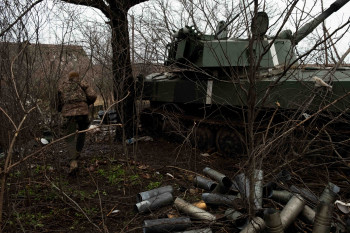Ukraine war latest: Putin says he wants 36-hour ceasefire, Zelensky says Russia doesn't want real truce

Key developments on Jan. 5:
- Putin says he wants 'Orthodox Christmas ceasefire.'
- Zelensky, Biden express skepticism over truce offer.
- General Staff says Russian troops focus efforts on capturing Donetsk Oblast.
- Russian troops continue arriving in Belarus, the country's Defense Ministry reports.
Russian President Vladimir Putin said he ordered his Defense Minister Sergei Shoigu to implement a temporary ceasefire in Ukraine, which was quickly dismissed by Ukrainian authorities as a facade.
The so-called Russian ceasefire is set to take effect from midday on Jan. 6 to midnight on Jan. 7 "to allow Orthodox Christians to attend Christmas services," according to Russian state media agency RIA Novosti.
President Volodymyr Zelensky dismissed Putin's words about an Orthodox Christmas ceasefire.
"Those who continued the terror against our country and sent their people to be slaughtered definitely do not value life and even more so do not seek peace," Zelensky said.
The truce offer has been met with skepticism from both Kyiv and the West, with many viewing it as a ploy by Putin to regroup.
"Who will believe scum that kills children, bombards maternity hospitals, tortures prisoners?" Oleksii Danilov, Ukraine's National Security and Defense Council Secretary, said.
U.S. President Joe Biden said he believes Putin is "trying to find some oxygen" with the proposed truce.
"I'm reluctant to respond (to) anything Putin says. I found it interesting. He was ready to bomb hospitals and nurseries and churches on Dec. 25 and New Year," he told reporters.
On Dec. 24, Russia launched a rocket strike on central Kherson, the southern city that was liberated in November after eight months under Russian occupation, killing ten civilians and wounding 58.
On New Year's Eve, Moscow carried out its latest mass missile attack on Ukrainian cities, which resulted in one death and 28 injuries around the country.
President's Office Deputy Head Kyrylo Tymoshenko reported that Moscow attacked Beryslav, Kherson Oblast, shortly after Russia's proposal, killing three people, including a 12-year-old child.
According to Tymoshenko, the family was preparing for the Orthodox Christmas celebrations when the attack occurred, "but a cynical blow by Russians killed them in their own home."
Attempts to capture eastern Donetsk Oblast continue
The General Staff said that Russian forces are focusing their main effort on an attempt to capture the eastern Donetsk Oblast, conducting offensive operations toward Bakhmut and Lyman.
Bakhmut, a city with a pre-war population of around 70,000, is one of Russia's primary targets. Seizing it could allow Russian forces to launch attacks on urban areas such as Kramatorsk and Sloviansk in Donetsk Oblast.
According to the Ukrainian military, Moscow's forces attacked Bakhmut, 12 settlements nearby, and four settlements near Lyman.
The Donbas region, made up of Ukraine's eastern Donetsk and Luhansk oblasts, is the scene of the war's most intense fighting.
Russia invaded and occupied parts of the oblasts for the first time in 2014, including the regional capitals of Donetsk and Luhansk.
In late December, Deputy Defense Minister Hanna Malyar said that Bakhmut is Ukraine's "eastern fortress," where Russia has concentrated the most military equipment and weapons.
More troops arriving in Belarus
The Belarusian Defense Ministry reported on Jan. 5 that Russian forces continue deploying personnel, weapons, military, and special equipment in Belarus.
As part of efforts to ensure the "military security of the Union State," Russia and Belarus are planning to hold joint flight and tactical training in order to increase the combat readiness of their aviation units, the ministry added.
While Belarus has allowed Russia to use its territory to attack Ukraine, Belarusian troops have not yet been deployed to the front line.
At the same time, General Oleksandr Pavliuk, Commander of the Forces and Means of Defense of Kyiv, has announced that Ukrainian military forces have formed a special fighting group on the border with Belarus, ready to defend against any potential offensive action.
"The multi-level system of protection of Ukrainian troops will not allow them (invading soldiers) to go beyond the Belarusian border," Pavliuk said.
Pavliuk emphasized that fortified positions and long-term defense structures have been established, making it very difficult for any Russian and Belarusian troops to cross the border.
He said that the defense system spans approximately 1,000 kilometers of total fortified lines.
In an interview with The Economist on Dec. 15, Ukrainian Commander-in-Chief Valerii Zaluzhnyi said that Russia is almost certainly preparing for a new large offensive in spring, which could be a second attempt at taking Kyiv from the north.
On the other hand, Ukraine's military intelligence chief, Kyrylo Budanov, said in an interview published on Jan. 4 that Kyiv anticipates the "hottest" fighting in March as it plans "a major push" in spring, and there may be further strikes "deeper and deeper" inside Russia.










